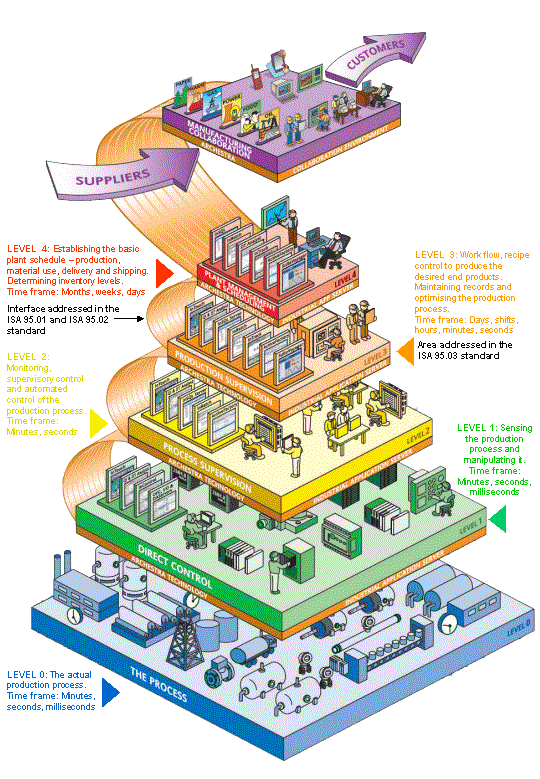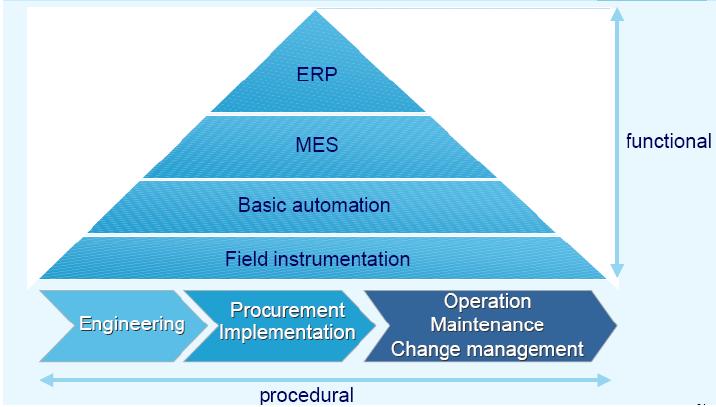Difference between revisions of "User:Tim/AutomationElaboration"
(→Automation) |
|||
| Line 9: | Line 9: | ||
In general most production facilities can be divided in these layers. | In general most production facilities can be divided in these layers. | ||
| − | == | + | == L0: Instrumentation == |
This is the layer that contains the machines and the electronics dealing with the machines. In the case of industrial automation, this are the relays to switch power for machines, electric motors, valves, sensors for flows, weight, pressure, temperature, light... To connect this to the rest of the system are their the I/O modules. This modules convert the usually analog signals to digital numbers and the digital numbers to currents, voltage and pulse width modulations. | This is the layer that contains the machines and the electronics dealing with the machines. In the case of industrial automation, this are the relays to switch power for machines, electric motors, valves, sensors for flows, weight, pressure, temperature, light... To connect this to the rest of the system are their the I/O modules. This modules convert the usually analog signals to digital numbers and the digital numbers to currents, voltage and pulse width modulations. | ||
| Line 15: | Line 15: | ||
[how to build relays and electric motors not discussed here] | [how to build relays and electric motors not discussed here] | ||
| − | The open source solution often used in small scale projects is the | + | The open source solution often used in small scale projects is the [http://arduino.cc Arduino]. It is a simple programmable micro controller with a few I/O pins. Some of this pins can be used as a [http://en.wikipedia.org/wiki/I%C2%B2C I²C bus] to add a lot more I/O modules. A standard way of interfacing in this way is to use [http://en.wikipedia.org/wiki/Modbus modbus] over ethernet. |
| − | == | + | == L1: Control == |
| − | In this layer is usually the classic | + | In this layer is usually the classic [http://en.wikipedia.org/wiki/Programmable_logic_controller PLC]. This thing monitors and controls all I/O. In automation projects it takes commands given by other systems like "add 100 liter water" and translates this into "open valve A, start pump B, wait to sensor C increases by 100, ...". |
| − | The open source solution for this is for example | + | The open source solution for this is for example [http://www.proview.se Proview]. This software changes a Linux computer to a PLC, capable of controlling I/O modules with modbus or other protocols. To run this on open source hardware any x86 computer or the [http://beagleboard.org/ Beagle Board] with ARM processor is available. |
| − | == | + | == L2: Supervisory == |
| − | + | Also referred to as [http://en.wikipedia.org/wiki/SCADA SCADA (supervisory control and data acquisition)] shows on screen the current activity of the installation and allows the operator to manually control the installation. Here too provides ProView an answer. | |
| − | == | + | == L3: MES == |
| + | |||
| + | The [http://en.wikipedia.org/wiki/Manufacturing_execution_system Manufactering and Execution system] performs higher level functions | ||
| + | - Resource Management (stock) | ||
| + | - Product Management (recipes, materials, parameters) | ||
| + | - Scheduling short term | ||
| + | - Dispatching (sending commands to level 2, reading results from level 2) | ||
| + | - Reporting | ||
| + | |||
| + | Open source implementations are [http://www.leanmes.net/ LeanMes] and [http://qcadoo.com/ qcadoo]. But there are not a lot complete implementations of this technology. | ||
| + | |||
| + | == L4: ERP == | ||
| + | |||
| + | Also known as [http://en.wikipedia.org/wiki/Enterprise_resource_planning Enterprise Resource Planning] is important for order management, supply chain management and long term planning. In a normal company this also does customer relation management, financial, invoices and others but for RBE this is not necessary. | ||
| + | |||
| + | One open source implementation is [http://www.openbravo.com/ OpenBravo] among others. | ||
| + | |||
| + | == Conclusion == | ||
| + | |||
| + | It is possible to make a complete system in open source software and hardware, except for the [http://en.wikipedia.org/wiki/Integrated_circuit Integrated Circtuis]. I/O, PLC and ERP applications are reasonably well defined. The MES systems are often not open source as these seem to contain a lot of customization and business know how. | ||
Latest revision as of 00:02, 10 March 2013
Contents |
[edit] Automation
< my plan is to add general summary of automation and usable current solutions for RBE >
In general most production facilities can be divided in these layers.
[edit] L0: Instrumentation
This is the layer that contains the machines and the electronics dealing with the machines. In the case of industrial automation, this are the relays to switch power for machines, electric motors, valves, sensors for flows, weight, pressure, temperature, light... To connect this to the rest of the system are their the I/O modules. This modules convert the usually analog signals to digital numbers and the digital numbers to currents, voltage and pulse width modulations.
[how to build relays and electric motors not discussed here]
The open source solution often used in small scale projects is the Arduino. It is a simple programmable micro controller with a few I/O pins. Some of this pins can be used as a I²C bus to add a lot more I/O modules. A standard way of interfacing in this way is to use modbus over ethernet.
[edit] L1: Control
In this layer is usually the classic PLC. This thing monitors and controls all I/O. In automation projects it takes commands given by other systems like "add 100 liter water" and translates this into "open valve A, start pump B, wait to sensor C increases by 100, ...".
The open source solution for this is for example Proview. This software changes a Linux computer to a PLC, capable of controlling I/O modules with modbus or other protocols. To run this on open source hardware any x86 computer or the Beagle Board with ARM processor is available.
[edit] L2: Supervisory
Also referred to as SCADA (supervisory control and data acquisition) shows on screen the current activity of the installation and allows the operator to manually control the installation. Here too provides ProView an answer.
[edit] L3: MES
The Manufactering and Execution system performs higher level functions - Resource Management (stock) - Product Management (recipes, materials, parameters) - Scheduling short term - Dispatching (sending commands to level 2, reading results from level 2) - Reporting
Open source implementations are LeanMes and qcadoo. But there are not a lot complete implementations of this technology.
[edit] L4: ERP
Also known as Enterprise Resource Planning is important for order management, supply chain management and long term planning. In a normal company this also does customer relation management, financial, invoices and others but for RBE this is not necessary.
One open source implementation is OpenBravo among others.
[edit] Conclusion
It is possible to make a complete system in open source software and hardware, except for the Integrated Circtuis. I/O, PLC and ERP applications are reasonably well defined. The MES systems are often not open source as these seem to contain a lot of customization and business know how.

